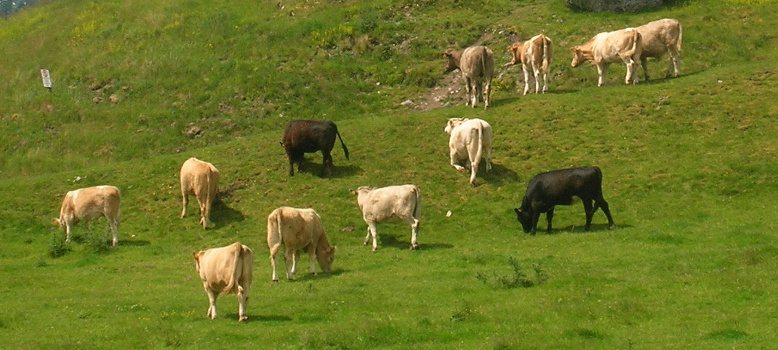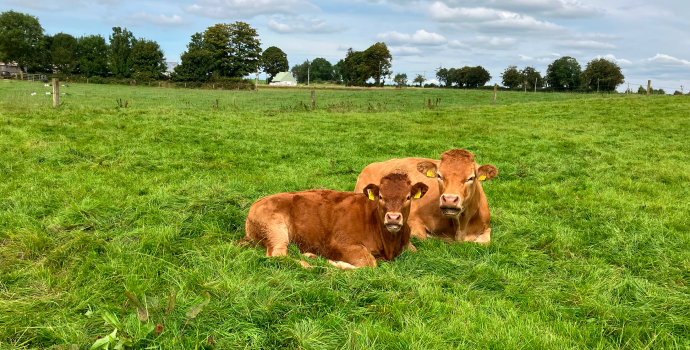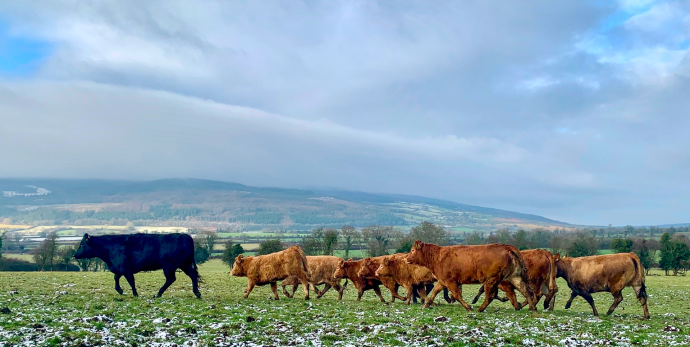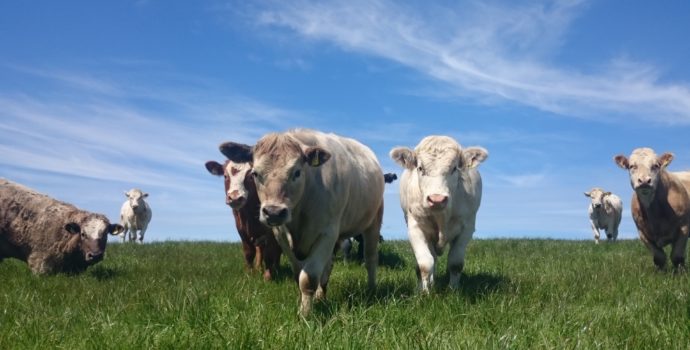Livestock Council Report April 2021

Market Report
Beef Price: Prices continue to edge upwards. Steers are generally making €3.85 to €3.95/kg base price. Heifers are making €3.90 to €4.00/kg with higher deals for larger lots and increased breed bonuses paid. Young Bulls are ranging from €3.75 to €3.95/kg for O/R/U grades. The cow trade strengthened during the week, P grades are making €3.15 to €3.20/kg, O grades €3.30 to €3.40/kg, R/U grades €3.50 to €3.65/kg.
DAFM Reported Prices w/e 28/03/21: Prices for the last week increased by 2c/kg to €4.04/kg for R3 steers, continuing the trend since w/e 28/02/21 when R3 steer price was €3.95/kg.
Beef Market Tracking: The Prime Irish Composite Price for last week increased by 3c/kg to €3.78 with the Export Benchmark Price increasing by 2c/kg to €3.89/kg
GB Cattle Prices as reported by AHDB: Prices in GB for R3 steers increased by 4p/kg in the latest week bringing the price to £3.98/kg
Sterling: Sterling has continued to strengthen since the beginning of the year reaching 85p/€ this week
The latest Commission reported R3 male cattle prices show Steers in Ireland excl. vat €3.83/kg (€4.04/kg vat incl.) UK Steers €4.58/kg and EU Young Bulls at €3.74/kg.
Latest DAFM Kill figures;
- Supplies: Supplies of cattle are predicted to be tight for the year in Ireland and the UK. Bord Bia predict Irish supplies to be back 60,000 to 80,000 head compared to last year. The kill to-date is back almost 60,000hd. UK supplies are predicted to be back 5% for the year.
- Market Conditions: Demand is strong from supermarkets where beef sales continue to perform strongly. The expected reopening of the food service sector in the UK from 12th April should increase demand for beef.
Live Exports
- For the week ending March 27th, live cattle exports reached 13,692 head
- For the first 12 weeks of 2021, the number of animals exported is running 3% behind the same period 12 months ago, with 85,703 head of cattle exported.
- The intra-community trade of Irish dairy calves was strong again this week, with 11,287 calves exported to Continental Europe.
- Live exports last week were helped by calm sea conditions and large numbers of calves becoming available to live exporters.
- Even with the strong intra community trade seen last week, calf exports have declined by 10% on the same period 12 months ago.
- The movement of cattle to Northern Ireland has continued to perform strongly with 1,933 head traveling north during the week ending March 27th.
- This included a combination of calves and store cattle for further feeding, along with 553 animals for direct slaughter.
- 24% of cattle exports so far this year have been to Northern Ireland.
- The live exports of animals to Northern Ireland for direct slaughter is expected to remain strong as prices remain more favourable in NI compared to the south.
- Live cattle exports to Northern Ireland are running 98% higher compared to the same time 12 months ago, with over 20,700 head exported so far this year.
Beef Meeting
- Over 250 farmers attended the IFA held online meeting for Beef farmers on 9th March.
- The meeting provided beef farmers with a presentation on current market conditions and provided an opportunity for farmers to express their frustration with the current market situation.
- The importance of Direct Payments for beef farmers was highlighted
Beef Task Force
- Following the unjustified dropping of quotes by factories and the divergence from the Export Benchmark Price IFA called for the Beef Task Force to be convened immediately and wrote to the chairman of the Task Force.
- The Beef Task Force met on the 9th of March 2021.
- Grant Thornton informed the Task Force that it does not have the authority to access the information needed to provide a detailed appraisal of the value of Irish beef from the farm to the consumer.
- The draft report by Grant Thornton fails to provide the details on the value of Irish beef throughout the chain because of these constraints.
- IFA called for Minister McConalogue to immediately advance the establishment of Office of the Food Ombudsman/Regulator and underpin it with primary legislation to provide full transparency in the beef supply chain.
- A public consultation is due to be launched to identify the extent of regulatory powers the office will need.
- The Minister has committed to enacting this primary legislation before the end of the year.
Suckler Brand
- The second meeting of the Suckler Brand development group took place on 26th March.
- Development of the Brand proposition should be concluded in the next number of months
- The Brand must promote the production systems on suckler farms and return a premium from the market place for beef originating on these farms.
Brexit
- The announcement by the UK Government of the revised timetable for SPS checks and controls removes uncertainty in our key export for the next number of months.
- Factories can continue to access the market without the uncertainty of the impact of additional checks and controls that were scheduled for April and July.
- This is a very positive development for beef sales and the clarity must be returned in higher prices to farmers
- Beef and suckler farmers must be first in line to have the impacts of Brexit addressed through the Brexit Adjustment Fund.
Mercosur
- The Mercosur trade deal will provide access for an additional 99,000/t of sub-standard beef to our key markets if allowed progress.
- IFA have highlighted the double standards applied by the commission in this trade deal compared to the standards demanded from Irish and EU beef farmers.
- IFA have called on the Irish Government to reject this deal.
- Irish beef farmers will be most impacted if this additional sub-standard beef is allowed onto the EU and UK marketplace.
- IFA are fighting a strong campaign at EU level to have the deal rejected.
- IFA have met the Commissioner for Agriculture and called for this deal to be stopped.
Chinese Market
- IFA have called on the Minister for Agriculture and Government to redouble their efforts to secure an immediate return of Irish beef to the Chinese market following the announcement that Ireland has fulfilled the criteria to attain OIE negligible risk status for BSE.
CAP
- Livestock farmers depend on Direct Payments for 160% of Family Farm Income
- Payments to active productive beef and suckler farmers must be protected in the new CAP.
- The payments and/or value of payments to active productive suckler and beef farmers must not be eroded in the new CAP policy through reduced efficiencies and productivity imposed in the National Strategic Plans
- Suckler farmers must receive a payment of €300/cow
New BEEP-S
- Applications for the new BEEP-S have opened. The closing date is Mon, April 26th.
BDGP
- IFA called for the cohort of farmers who participated throughout the scheme but did not qualify for payment last year to be provided with the opportunity to join the scheme for 2021.
BEAM
- IFA met senior DAFM officials on the flexibilities provided by the commission.
- The key objective must be to ensure these monies are protected.
- A six-month extension to the scheme has been granted to give farmers more time to meet the 5% reduction.
- This offers participants the option to choose the reference period 1st January to 31st December 2021.
- IFA have sought the provision of a rolling 12-month period within these 18 months.
- IFA have sought a further extension to the timeframe.
- Applicants will be required to apply between April and June to avail of the extended period.
- However, if applicants meet the reduction requirement by the end of June for the original reference period this will be automatically accepted as compliance.
- It is advisable that all farmers in the scheme apply for the extension.
- More relevant and detailed monthly updates are provided by DAFM, including the provision of an on-line calculator on Agfood.ie to project forward.
- The March and subsequent letters will also include a DAFM projected figure for the herd to the end of June.
- IFA have sought the recognition of a TB breakdown during the course of the reference period as Force Majeure and the 5% requirement be removed.
- DAFM have committed to applying the same criteria as is applied in the Nitrates calculation for restricted herds.
- IFA have sought a reduction in the sanctions for participants who fall short of the 5% requirement but have recorded a reduction in their herd.
| Brendan Golden Chair | Anna Daly/James Walsh Policy Executives | Tomas Bourke Senior Policy Executive |



